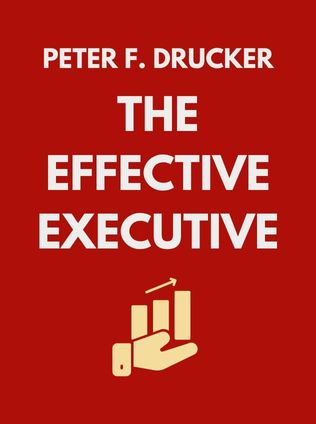
The Effective Executive
The Definitive Guide to Getting the Right Things Done (Harperbusiness Essentials)
By Peter F. Drucker
Published 01/1966
About the Author
Peter F. Drucker, often hailed as the father of modern management, was a visionary thinker whose ideas have profoundly influenced the way organizations are run. Born in Vienna, Austria, in 1909, Drucker was educated in law and earned his doctorate in international law from Frankfurt University. His career spanned more than 60 years, during which he authored 39 books and countless articles. His work covered a broad range of topics, from economics and politics to philosophy and society, but he is best known for his contributions to management theory. Drucker’s teachings have shaped the practices of leaders and executives across the globe, and his concepts continue to be foundational in management education and practice. His book, "The Effective Executive," published in 1966, is one of his most influential works, providing timeless advice on how to be an effective leader in any organization.
Main Idea
In "The Effective Executive," Peter Drucker argues that the effectiveness of an executive is not determined by their intelligence, talent, or charisma but by their ability to manage themselves and their work. Effectiveness, Drucker asserts, is a learned skill, and it can be developed through disciplined practice. The book outlines five essential practices that executives can adopt to become more effective: managing time, focusing on key priorities, making a unique contribution, leveraging strengths, and making sound decisions. Drucker emphasizes that these practices are not just for top executives but for anyone who wishes to improve their effectiveness in a leadership role. By mastering these practices, individuals can significantly enhance their productivity and make a meaningful impact on their organizations.
Table of Contents
- Introduction
- Manage Your Time
- Focus on Key Priorities
- Make Your Unique Contribution
- Maximize Strengths—Yours and Others’
- Make Sound Decisions
- Conclusion
Manage Your Time
Drucker begins with the premise that time is the scarcest resource for any executive. Unlike money, people, or equipment, time is finite and irreplaceable. Once lost, it cannot be recovered. Therefore, managing time effectively is the starting point for any executive who wants to be effective. Drucker argues that many executives fail to realize how much of their time is wasted on activities that do not contribute to their organization’s goals. To address this, he outlines a three-step process for managing time: analyzing time, eliminating time-wasters, and time-blocking.
The first step, analyzing time, involves tracking how time is spent over a period of several weeks. This exercise often reveals that a large portion of time is consumed by tasks that are either unproductive or could be delegated. Drucker emphasizes that this step is crucial because it allows executives to understand where their time goes and identify areas for improvement. Once time-wasting activities are identified, the next step is to eliminate them. Drucker suggests that many executives could eliminate up to 25% of their activities without any negative impact on their work. These might include unnecessary meetings, redundant reporting, or tasks that can be delegated to others. Finally, Drucker advocates for time-blocking, a technique where large, uninterrupted blocks of time are allocated for critical tasks. He argues that this approach is far more effective than working in short increments, which often leads to fragmented attention and reduced productivity.
Sign up for FREE and get access to 1,400+ books summaries.
You May Also Like
The Subtle Art of Not Giving a F*ck
A Counterintuitive Approach to Living a Good Life
By Mark MansonRich Dad Poor Dad
What the Rich Teach Their Kids About Money - That the Poor and Middle Class Do Not!
By Robert T. KiyosakiHow To Win Friends and Influence People
The All-Time Classic Manual Of People Skills
By Dale CarnegieQuiet: The Power of Introverts
The Power of Introverts in a World That Can't Stop Talking
By Susan Cain



















